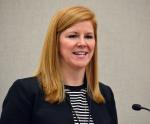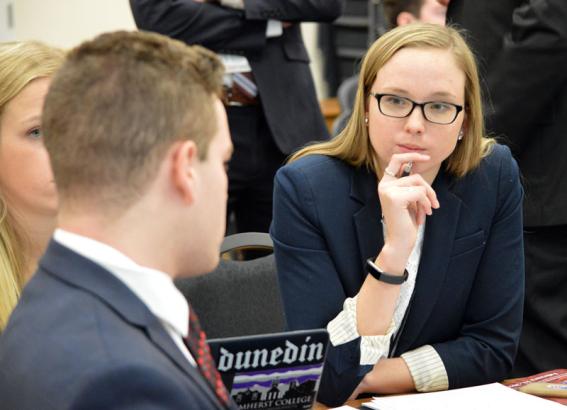Spotlight on Experiential Learning at Student-Run Sport Management Conference
February 17, 2017
I

The UMass graduate was one of eight industry professionals who mentored fifty students (half of them from UMass Amherst; the rest from other university programs in the Northeast) during the daylong McCormack event. The heart of the student-run conference engaged student teams in four case studies. It also offered generous networking opportunities and insights via a panel of recently graduated young industry professionals (i.e., “young guns”).
In her keynote talk, Hogan, whose consulting team creates marketing opportunities and buzz (most of it in the sports world) for Dunkin’ Donuts, Jet Blue, Santander Bank, and other clients, underscored the importance of relationship building, and a willingness to take calculated, entrepreneurial risks. “Our office has a true entrepreneurial spirit,” she told the students. “We become an extension of our clients.” At the same time, “everyone is looking at ROI; we [draw heavily] on our analytics group,” she continued. “That becomes really important in negotiations [on behalf of our clients]. Negotiations are all about preparation—they’re the favorite part of my job.” The sports industry, she emphasized, is ultimately “small and familial,” she emphasized. “Relationships are your biggest asset.”
The Heart of the Matter
Next on the agenda, the students tackled four case studies, each devoted to a separate sport industry function: marketing, finance, sales, and event/facilities management. As the students—some in pairs, others in teams of four—immersed themselves in the cases, the industry professionals periodically monitored their work, offering advice and additional feedback. Where did the cases originate? “We created them ourselves with help from industry professionals,” noted conference chairman Nicholas Kaminski ’18, who shared the work and conference coordination with six other McCormack students.* “Devising those cases was itself a learning experience—almost like an internship,” he added.
Advice from “Young Guns”

Adam Tuval ’13, a corporate partnership manager with the Philadelphia 76ers emphasized commitment to a team culture. “Celebrate everyone’s successes as if they’re your own,” advised Tuval, who sells partnerships to local, regional, and national brands. “Be a sponge. Surround yourself with successful people who you can learn from for the rest of your career.” That includes, he continued, taking ten to fifteen minutes each day to learn about departments other than your own.
Proactivity and culture are critical, emphasized Fordham graduate Louis Frangella, a senior account executive on Brooklyn Sports & Entertainment’s partnership marketing team. If there’s no cultural fit, the position probably won’t be right for you,” he observed. To get a bead on that in an interview, “ask what the first ninety days of your role will be like. I’m a very sales-minded marketer,” he continued. “My own mentor always advised—be authentic with people. That advice has served me well.”
It’s critical, added NYU graduate Samson Feldman “to find that place where you’ll learn; to find that mentor.” At the same time, you need to ask “how you can be a good mentee; how you can help them,” remarked Feldman, who is also a senior account executive with Brooklyn Sports & Entertainment. In your interview, he continued, don’t be afraid to say you want the job but “don’t ask what’s the next role after this.” And once on the job, “do everything to differentiate yourself as early as possible—including job shadowing of your boss.”
________________________________________________________________
*Andrew Petricone ’17, Anthony Nahill ’17, David Tews ’17, Andrew LaPlante ’19, Kate Avard ’17, Abigail Rice ’17.
The committee’s faculty advisor was Emily Must.
The event’s principal sponsor was AEG Facilities.